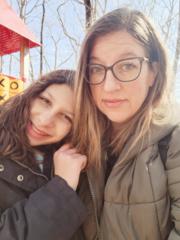
Write something
Starving the Beast: How to Stop Feeding Anxiety"
Anxiety is like a stray animal. The more you feed it, the more it sticks around. Every time you check, seek reassurance, or overanalyze… you’re tossing it a snack. Every time you avoid something because of fear… you’re serving it a full meal. And just like that—the beast grows. This is how health anxiety, OCD, and intrusive thoughts work. They survive by convincing you that you have to engage. That you need to check one more time. That this one thought is different. But there’s only one way to weaken it: 🔥 Starve the beast. 🔥 When the urge to check rises? Don’t feed it. When your brain demands reassurance? Let the question go unanswered. When the panic tells you to react? Do the opposite, stay, breathe, and watch it fade. At first, the beast will get louder. It will claw at you, demanding its usual meal. But the moment it realizes you’re not playing anymore… It starts to shrink. Because anxiety isn’t just about fear, it’s about habit. Break the cycle. Starve the beast. And watch yourself take back control. Danny
"What If You’re Not Lost, You’ve Just Outgrown the Map?"
You keep searching. For direction. For clarity. For the feeling that you’re on the right path. But what if you’re not lost at all? What if the only reason you feel uncertain is because the map you’ve been following no longer fits who you are? The old goals don’t excite you anymore. The old ways of thinking don’t make sense. The old identity feels like a jacket that’s two sizes too small. That’s not failure. That’s evolution. But here’s the hard part, letting go of the old map before you have a new one. That space in between? It feels like free-fall. It feels like nothing is certain. It feels like something inside you is saying, “I don’t know where I’m going anymore.” And that’s exactly where you’re supposed to be. Because the old path got you here. But it’s not the one that’s going to take you where you’re meant to go next. So maybe the goal isn’t to find your way back. Maybe the goal is to start walking and build a new map as you go. Danny
2
0
"What If Your Version of Self-Love Is Distorted?"
You hear it all the time: "Be kind to yourself." "Love yourself." "Give yourself grace." Sounds great. But what if your version of self-love is completely distorted? What if the way you think you’re being kind to yourself… isn’t actually kindness at all? If you grew up believing love had to be earned, then “self-love” might look like constant self-improvement, never actually allowing yourself to rest. If you learned that care only came after exhaustion, you might only be “gentle” with yourself once you’re completely burned out. If compassion was always mixed with guilt, you might struggle to let yourself off the hook without feeling like you’re doing something wrong. You’re trying to love yourself, but from a blueprint that was never built for real love. So maybe that’s why it feels unnatural. Maybe that’s why it doesn’t stick. Maybe that’s why self-care just feels like another chore, another thing to “get right.” So here’s the real work: 💡 Instead of forcing self-love, question what you think love actually is. Does your version of kindness allow space for mistakes? Does your version of patience include yourself, or just everyone else? Does your version of love feel safe, or does it feel like another demand? Because real self-love isn’t just doing “nice things” for yourself. It’s unlearning everything that told you love had to be earned in the first place.
2
0
"You Don’t Need a ‘Bad Childhood’ to Have Trauma"
A lot of people hear the word trauma and immediately think: ❌ “That doesn’t apply to me.” ❌ “I had a great childhood.” ❌ “My parents loved me.” And maybe that’s true. Maybe there was no obvious abuse, neglect, or chaos. Maybe you were fed, clothed, cared for, and told you were loved. But here’s the truth most people never consider: 💡 Trauma isn’t just what happened to you, it’s how you learned to see yourself because of it. It can be how your interpretations and perceptions were moulded. Maybe you had loving parents, but they only praised you when you achieved something. So you learned: I have to earn my worth. Maybe no one ever yelled at you, but emotions were brushed aside with “You’re fine” or “Stop overreacting.” So you learned: My feelings aren’t valid. Maybe you were never abandoned, but you were expected to be the “good one,” the strong one, the one who never made trouble. So you learned: Love means being easy, agreeable, and low-maintenance. And now? 🔹 You overthink every interaction. 🔹 You struggle with feeling ‘not enough.’ 🔹 You push yourself to exhaustion, never feeling like you can slow down. 🔹 You feel guilty for wanting more, like you’re being ungrateful. That’s because trauma isn’t always an event. It’s the conditioning that shaped the way you experience life. This is why so many people say, “I have no reason to feel like this.” But your nervous system isn’t reacting to logic. It’s reacting to patterns that were set in place long ago. Understanding this changes everything. 🚫 Stop minimizing your struggles just because you didn’t “have it bad.” 🚫 Stop comparing pain as if only extreme suffering is valid. ✅ Start recognizing where your perceptions were moulded—and how they might still be running your life. Because the root of anxiety isn’t always in what happened to you. Sometimes, it’s in what you were taught to believe about yourself and the world around you. Danny
"Distraction isn’t bad. It’s the intention behind it that matters."
We all distract ourselves sometimes. Scrolling on our phones. Watching TV. Grabbing a snack. And guess what? That’s okay. Distraction isn’t the enemy. The problem is when we use it to run from anxiety rather than redirect our focus with intention. Here’s the difference: Mindless distraction = Avoidance. It keeps anxiety lurking in the background, waiting to return the moment you stop. Intentional diversion = A reset. It shifts your nervous system without suppressing what you're feeling. Next time anxiety hits, instead of asking: "How do I escape this?" Try: "How can I shift my focus in a way that supports me?" That might mean going for a walk, listening to music, or even watching TV, but with awareness. You’re not running. You’re choosing. And that makes all the difference. Danny
1-24 of 24

skool.com/dannys-way-stepping-stones-1756
"Danny's Way is about finding your way—a supportive space to heal, grow, and uncover your inner strength with actionable steps and real results."
Powered by





